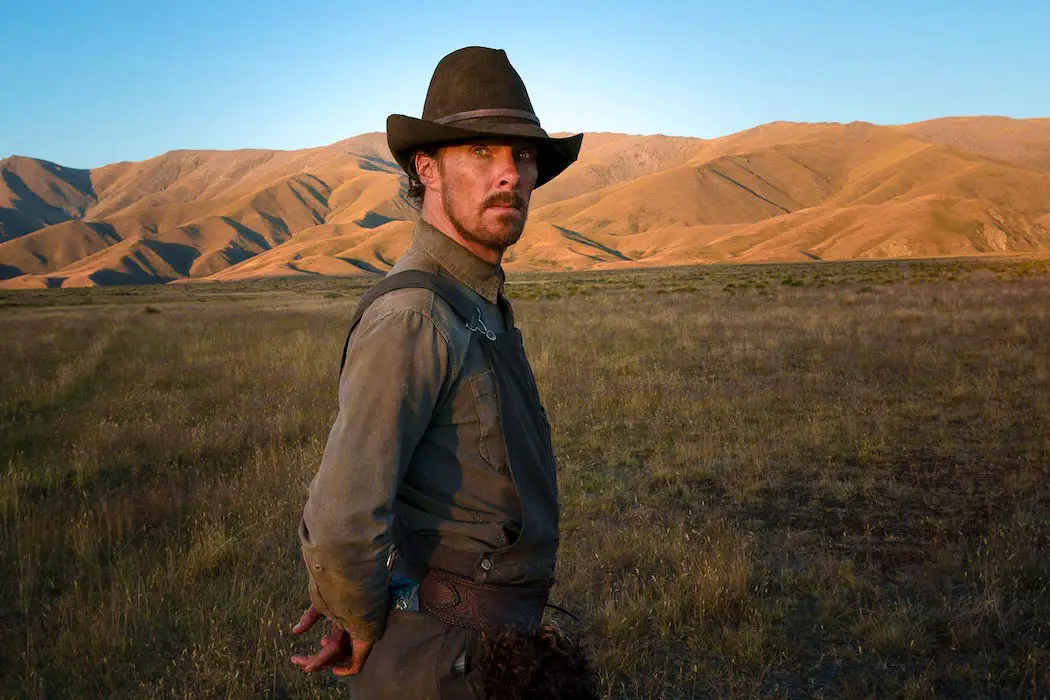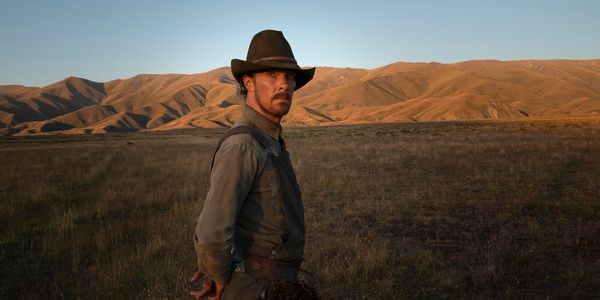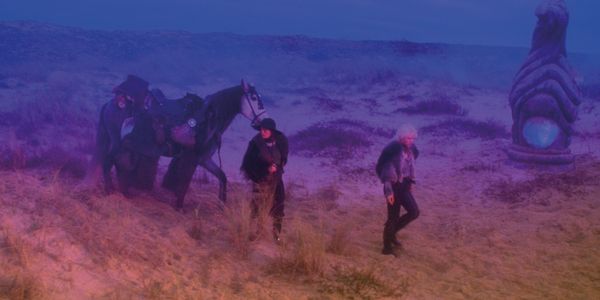TIFF 2021 Roundup: THE POWER OF THE DOG, BENEDICTION, AFTER BLUE, and COMPARTMENT NO. 6

Soham Gadre is a writer/filmmaker in the Washington D.C. area.…
At this year’s Toronto International Film Festival, a smattering of the years past festival favorites take center stage. With the pandemic having shut down most in-person screenings last year, the fest started showing them again this year. This comes with pros and cons, where distribution rights and production demands made certain films unavailable to people who weren’t able to be physically in Toronto. This made reviewing major works like Titane and Dune unreachable, but it also gives an outlet of exposure to smaller films that may have otherwise been buried in the coverage amid the big names. While Jane Campion’s The Power of the Dog and Terence Davies’ Benediction were certainly event-films by major filmmakers making a return after an absence, one should not shrug aside Bertrand Mandico’s After Blue, perhaps the most polarizing vision of the fest, nor Juho Kuosmanen’s sophomore feature Compartment No. 6, a charming odd-couple story that is, in my opinion, the best of this roundup. Onto the movies:
The Power of the Dog (dir. Jane Campion)

The magic trick within this movie is not soft-spoken Brit Benedict Cumberbatch’s convincing act as a sour and salty Montana rancher, but director Jane Campion convincing us the outskirts of New Zealand is the American West. Taking place mostly on a ranch that seems like a Mars colony in the vast expanse of nothingness that surrounds it, The Power of the Dog features characters who are at all times experiencing a crushing sensation of entrapment in its isolation. A sequence where the films’ central couple George (Jesse Plemons) and Rose (Kirsten Dunst) slowly dance together in this open enclosure is a poignant sequence of love amid loneliness. Their existence however becomes harder and harder to deal with as the presence of George’s brother Phil (Cumberbatch) becomes more difficult to ignore.
After George marries Rose and brings in her close son Peter (Kodi Smit-McPhee) to their abode, they are all thrust together as a family with Phil, a situation the latter openly and plainly rejects with cutting words. The ensuing dynamics of entrapment keep everyone at the mercy of Phil’s resentment and cruelty. It gets more and more intense, and ultimately deceptive. Other filmmakers like Lars von Trier, who has utilized these sorts of dynamics before and worked with Dunst, tend to pack on the emotional wallops, but Jane Campion maintains a restrained approach to her drama. A few moments boil over in frustration but for the most part, the narrative allows us to muster both anger and empathy in equal measure towards many characters.
The handling of well fleshed out characters playing off each others’ emotions also leads to a good bit of misdirections of intentions. As Phil’s true nature begins to show, and his insecurities underneath his brash cowboy exterior become vulnerable, the movie allows us to be swayed by him. Campion is not holding anyone’s hand in this film. There is a risk of betrayal that the movie fully embraces in never revealing its characters’ full deck of cards. For a cinema culture of late that likes to flash its intentions like traffic signs, it’s refreshing to see a drama treat its audience with a little more respect for their intelligence.
Benediction (dir. Terence Davies)

In his last two films, Terence Davies has turned his eyes towards a wryer cinema. That’s not to say his earlier films did not have moments of sardonic humor nor is it to say his latest are not peppered with pain. Benediction, much like A Quiet Passion, tends to carry with it an air of cutting wit, informed by the literary prowess of its central figure Seigfried Sassoon, that brushes the film’s serious subject matter with a light breeze. Also like A Quiet Passion, it deals with the alienation of politics and identity rather than that of class, unlike Davies’ much bleaker social dramas.
Despite the differences, Davies’ core repertoire for heavy emotional burden often elicited through music and a mix of cruel and nostalgic memories is still at play here. Sassoon is a conscientious objector, refusing to take any more part in The Great War. He is brought to a hospital where he is diagnosed with an illness so that his lack of patriotism does not become a public record. As a writer, he has a sharp wit and tongue and much of the dialogue in the movie comes off in amusingly passive-aggressive jabs, especially among his several gay partners who come and go in his life.
As Mel Gibson’s Hacksaw Ridge took the road of the classic Hollywood redemption tale and Terrence Malick’s A Hidden Life that of religious martyrdom, Benediction maintains a grounded political approach taking the idea of conscientious objection to mean a decision based on personal values and thus translated to a political ideology. Davies interjects the movie with archival war footage and excerpts from Sassoon’s essays, letters, and poems creating a constant linkage to the ways that Sassoon lived as a closeted gay man was in many ways a contrast to his open objection of the war. It’s a subtle commentary of hypocrisy that, while the latter is of course met with derision it is performative derision (such that all nationalism is a hollow performance), and the former is still yet considered a much worse affront or sin in English society.
Jack Lowden gives a fantastic performance, delivering a soft and soulful portrayal of Sassoon that is immediately empathetic to his plights. Similar to Cynthia Nixon in A Quiet Passion, Lowden also stems much of the energy for his character from the way he says things as much as what he says and the stillness of his isolation. As Davies’ movies center on the social dynamics and the ways that clashing personable conflicts manifest emotion, Benediction succeeds ultimately on Lowden embodying the complexities of a man whose life is defined at once by a lie and a powerfully honest truth.
After Blue (dir. Bertrand Mandico)

Bertrand Mandico is a filmmaker who I’d love to love. His movies have gonzo, acidic verve to them, and feel like Alejandro Jodorowsky’s movies churned up in a cotton candy machine. I can’t go as far as “love” for After Blue, however, because for as much of a catchy atmosphere and very watchable pallet of shapes and colors that glitter and spill across the screen as there are, the hypnotic nature of the film becomes dreary and monotonous. It’s not the fact that there isn’t really a story or nothing that makes sense – those things don’t matter – but that in the grind of it all, Mandico seems only interested in vague alien tapestries.
Gender is an obvious and intrinsic part of Mandico’s plots and in the absence of men in the film’s premise, roles of aggression and societal hierarchies abide by a different set of rules. On a lonely planet of only females called After Blue, a young blonde girl named Roxy (Paula Luna) must go and find a serial killer named Kate Bush (Agata Buzek) who killed three of her friends. Roxy and Kate Bush are both pale and blonde on a planet where most of the other women have dark hair. Roxy is also timid and unaggressive and she is picked on by many of the other women who assume the roles of macho cowgirls.
The genre-blending of the movie, space-western meets sexual high fantasy, provides for some zany moments and lots of non-sequitur plot threads a la another revisionist western El Topo but there isn’t much investment in what these characters want or hope to attain. Revenge is perhaps the singular motivating factor but is that all there is? The major flaw of After Blue may be that its characters don’t really earn the investment of being avengers or saviors or retaliators. They seem to be just as many pawns of Mandico’s world as everyone else. That might be fine if the films’ world was engrossing enough or its visual style inventive enough, but there needs to be more than just a slapdash of pretty colors.
Compartment No. 6 (dir. Juho Kuosmanen)

Juho Kuosmanen’s Compartment No. 6 is one of the most universally relatable dramas I’ve seen in a while. It keenly discerns the nature of how we form and break friendships, push and pull back boundaries, and learn about each other while consistently trying to hide. Featuring a charming mismatched pair in Laura (Seidi Haarla) and Vadim (Yuriy Borisov) traveling to Murmansk, we’re brought into the four walls of a train car room most of the movie. It’s obvious from the get-go that these two are complete opposites in personality and life experience. Laura is initially agitated with Vadim’s drinking and drunk stupors but then starts to open up in mischievous ways, teaching him false translations of Finnish to Russian, making him say “f*ck you” instead of “thank you” etc.
Perhaps not to be taken to apply too broadly towards how Finnish and Russian people generally are, the cultural stereotypes that illicit much of the comedy in the film have a knowing sense of humor – Finns as darkly humorous but often closed off individuals and Russians as obsessed with vodka and forthright and blunt in their approach to conversation. Yet, these two polar opposites find commonalities over time to sympathize with. This, of course, comes with its own set of problems.
Kuosmanen, who previously made another charmer in his debut The Happiest Day in the Life of Olli Maki, says that the movie was conceived initially as a film about two people who dislike each other opening themselves up, but after the film was completed, he realized it was rather about two people who grew more scared of revealing themselves. Vadim for sure becomes more aware of how close he and Laura and becoming and starts to retreat. His mood sours in turns and there is miscommunication and breaking of friendship again. He however does invite Laura to his mother’s home where they drink merrily and talk.
Compartment No. 6 is relatable in the way that it creates situations that we’ve all felt before. Open, exposed, perhaps a little uncomfortable that a stranger has become a friend. Situations where a friendship has grown so close that you don’t want it to end, so push them away before the inevitable conclusion. Laura is on a trip to visit an archeological site and Vadim is a miner, a conscious and cute little coincidence that Kuosmanen creates that really gets at their inner workings. Laura is open to discovery while Vadim digs a hole for himself and hides, Laura is an academic of high standing while Vadim is a working-class man with a rough life. In the end, Kuosmanen makes clear that their friendship represents a meeting of people, and as Laura searches for her elusive archeological site and Vadim helps here, the wind and the ocean wash away what they are and only leave behind who they are.
Which films from this year’s TIFF are you most interested in seeing? Let us know in the comments below.
Does content like this matter to you?
Become a Member and support film journalism. Unlock access to all of Film Inquiry`s great articles. Join a community of like-minded readers who are passionate about cinema - get access to our private members Network, give back to independent filmmakers, and more.
Soham Gadre is a writer/filmmaker in the Washington D.C. area. He has written for Hyperallergic, MUBI Notebook, Popula, Vague Visages, and Bustle among others. He also works full-time for an environmental non-profit and is a screener for the Environmental Film Festival. Outside of film, he is a Chicago Bulls fan and frequenter of gastropubs.













